Marine Chemistry
Introduction
Marine chemistry, also known as ocean chemistry, is a branch of oceanography that studies the chemical composition and processes of the world's oceans. It is an interdisciplinary field that combines aspects of analytical chemistry, physical chemistry, environmental science, and marine biology to understand the complex interactions between the ocean's living and non-living components.


Chemical Composition of Seawater
Seawater is a complex mixture of various chemical elements and compounds. The most abundant element in seawater is hydrogen, followed by oxygen. Together, these two elements form water molecules, which make up about 96.5% of seawater by weight. The remaining 3.5% consists of dissolved salts, primarily sodium chloride (NaCl), also known as table salt.
In addition to these major components, seawater also contains a variety of trace elements and nutrients. These include magnesium, calcium, potassium, and sulfur, as well as smaller amounts of carbon, nitrogen, and phosphorus. These nutrients are essential for the growth and survival of marine organisms.
Chemical Processes in the Ocean
The ocean is a dynamic system where numerous chemical reactions occur. These processes are driven by various factors, including temperature, pressure, light, and the presence of other chemicals and organisms.
One of the most important chemical processes in the ocean is photosynthesis, carried out by phytoplankton and other marine plants. During photosynthesis, these organisms use sunlight to convert carbon dioxide and water into glucose and oxygen. This process not only produces food for the organisms but also contributes to the ocean's role as a major sink for atmospheric carbon dioxide, helping to regulate the Earth's climate.
Another significant process is respiration, where marine organisms consume oxygen and organic matter to produce energy, releasing carbon dioxide and water as by-products. This process, along with the decomposition of dead organisms, contributes to the cycling of nutrients in the ocean.
Marine Biogeochemical Cycles
Marine biogeochemical cycles are the processes by which chemical elements and compounds are transferred between the living and non-living components of the ocean. These cycles play a crucial role in maintaining the ocean's chemical balance and supporting its diverse ecosystems.
The carbon cycle is one of the most important biogeochemical cycles in the ocean. It involves the exchange of carbon between the ocean, atmosphere, land, and marine organisms. The ocean absorbs a significant amount of carbon dioxide from the atmosphere, which is then used by marine plants for photosynthesis. The carbon is transferred through the food chain as organisms consume each other, and eventually returned to the environment through respiration and decomposition.
Other important marine biogeochemical cycles include the nitrogen cycle, the phosphorus cycle, and the sulfur cycle. In these cycles, nutrients are taken up by marine organisms, transferred through the food chain, and eventually released back into the environment, where they can be reused by other organisms.
Impact of Human Activities on Marine Chemistry
Human activities have a significant impact on marine chemistry. One of the most notable impacts is ocean acidification, caused by the increased absorption of carbon dioxide from the burning of fossil fuels. This leads to a decrease in the pH of seawater, making it more acidic. Ocean acidification can have detrimental effects on marine organisms, particularly those with calcium carbonate shells or skeletons, such as corals and shellfish.
Another major impact is eutrophication, caused by the excessive input of nutrients (particularly nitrogen and phosphorus) from agricultural runoff and sewage discharge. This can lead to harmful algal blooms, which can deplete oxygen levels in the water and cause significant harm to marine life.
Future Directions in Marine Chemistry
Marine chemistry is a rapidly evolving field, with new technologies and methodologies continually being developed. Future research in this field is likely to focus on understanding the impacts of climate change on marine chemistry, developing strategies to mitigate these impacts, and exploring the potential of the ocean for carbon sequestration and other climate mitigation strategies.
